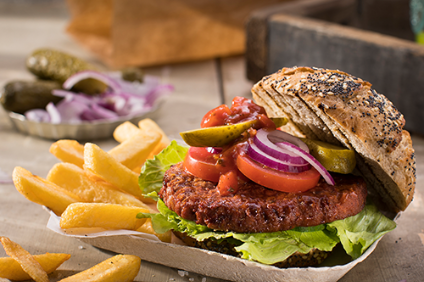
European sales of meat and dairy alternatives are to grow by 10% a year between 2020 and 2025, according to new forecasts from Dutch bank ING.
Achieving that rate of growth would see sales hit EUR7.5bn (US$8.86bn) in five years’ time, the bankers said in report published today (22 October).

Discover B2B Marketing That Performs
Combine business intelligence and editorial excellence to reach engaged professionals across 36 leading media platforms.
However, based on that projection, in 2025 plant-based meat would still account for 1.3% of Europe’s total meat market, ING estimated. Sales of plant-based dairy would generate 4.6% of sales, the report forecast.
But claims from some plant-based businesses that meat-alternative sales will surpass those of meats products over the next decade or so seem wide of the mark with ING’s research – published today (22 October) – suggesting market share for meat and dairy alternatives is set to increase to only 1.3% and 4.6% respectively by 2025.
The bank’s report – Growth of Meat and Dairy Alternatives is Stirring up the European Food Industry – revealed retail sales of meat-free and dairy-free substitutes more than doubling in the EU and the UK over the last decade.
However, plant-based alternatives are still a small category: 0.7% of the total meat market and 2.5% of the total dairy market, ING said.

US Tariffs are shifting - will you react or anticipate?
Don’t let policy changes catch you off guard. Stay proactive with real-time data and expert analysis.
By GlobalDataThe UK is the most-developed market, with retail sales of nearly EUR1bn, followed by France and Germany. Consumption per capita is highest in the Nordics and the Benelux.
At present the value of the meat market in Europe is EUR188bn, with the dairy market valued at EUR118bn.
ING pointed out that even if retail sales of meat and dairy alternatives keep growing by 10% per year after 2025, we are unlikely to see sales of these alternatives surpass sales of meat and dairy until 2050 or beyond.
Its economists have found that the UK is leading the way with lower prices because the UK plant-based market is more mature, and the retail environment is highly competitive. It said this is notable compared to markets such as Italy, where plant-based alternatives are still mainly targeted at consumers who are willing to pay a premium for these products.
Thijs Geijer, ING’s sector economist for food & agri, said: “In the past ten years plant-based alternatives have moved beyond niche status and now reach a larger group of so-called ‘flexitarian’ consumers. We have found that younger consumers are at the forefront of this shift.”
The report concluded more will need to be done to make plant-based products more inclusive for the majority of European consumers. To compete with popular meat and dairy products and maintain the current growth rates, producers of plant-based alternatives have to improve in terms of pricing, user experience – which includes taste – and availability in both retail and foodservice channels, it said.
Geijer added: “Plant-based alternatives draw a lot of attention, but the hard numbers show that the dominant role of meat and dairy in European diets is far from over, despite the momentum behind various market leaders.”
In June, Pat Brown, founder and CEO of US meat-alternative group Impossible Foods, suggested plant-based food will “completely replace” meat within 15 years.





